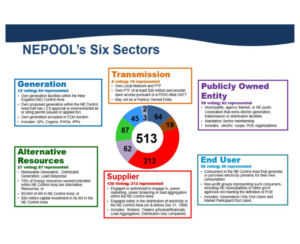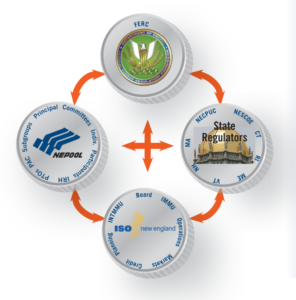NEPOOL’s Evolution
From its original formation nearly 50 years ago, NEPOOL has evolved in response to the changing needs of the region.
1971 – In response to the great Northeast blackout of 1965, the New England Power Pool (“NEPOOL”) was formed to coordinate transmission planning and to achieve economic and reliability benefits through coordinated regional dispatch of power.
1997 – NEPOOL contracted with ISO-NE to support the formation, operation and administration of the regional tariff and market rules.
1999 – New England’s competitive wholesale markets went live.
2005 – Following negotiations among NEPOOL members, state officials and ISO-NE to form RTO arrangements for New England, NEPOOL turned over control of the regional tariff and market rules to ISO-NE.
Membership
NEPOOL has over 500 members with diverse and varied interests. Its members include not only entities that own and operate bulk power facilities, but many others who are tasked specifically to represent the interests of consumers broadly, including 50+ consumer-owned utility systems, public interest groups, the offices of public advocates from four of New England’s six states (Connecticut, Maine, Massachusetts and New Hampshire), and end-use consumers themselves. Members align with one of NEPOOL’s six sectors.

Key Goals & Relationships
-
Ensure opportunities for meaningful stakeholder input into regional decision making
-
Allow informed participation and encourage ongoing market improvements
-
Provide forums designed to maximize consensus among all stakeholders
Through NEPOOL, informed and quality feedback is provided, at all levels, between and among Participants, state regulators and representatives, the ISO, and the FERC. Informal feedback, which is a combination of education on and definition of positions, helps to identify areas of consensus and resolve a great many issues, while narrowing and clarifying areas where consensus is not achieved through the give and take of the NEPOOL process. Formally, NEPOOL’s feedback then culminates in votes of the Principal Committees.


